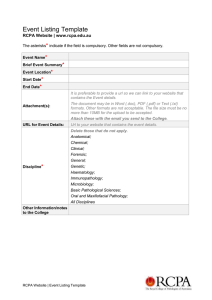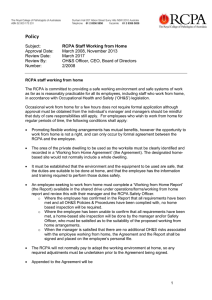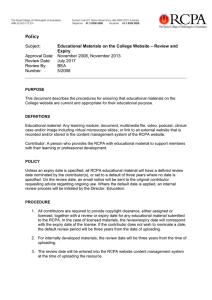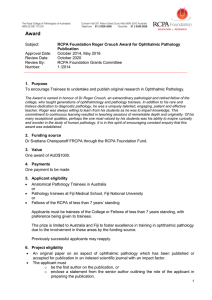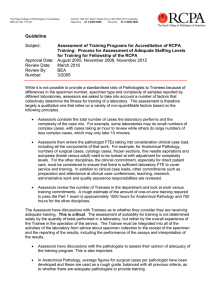Guideline
advertisement
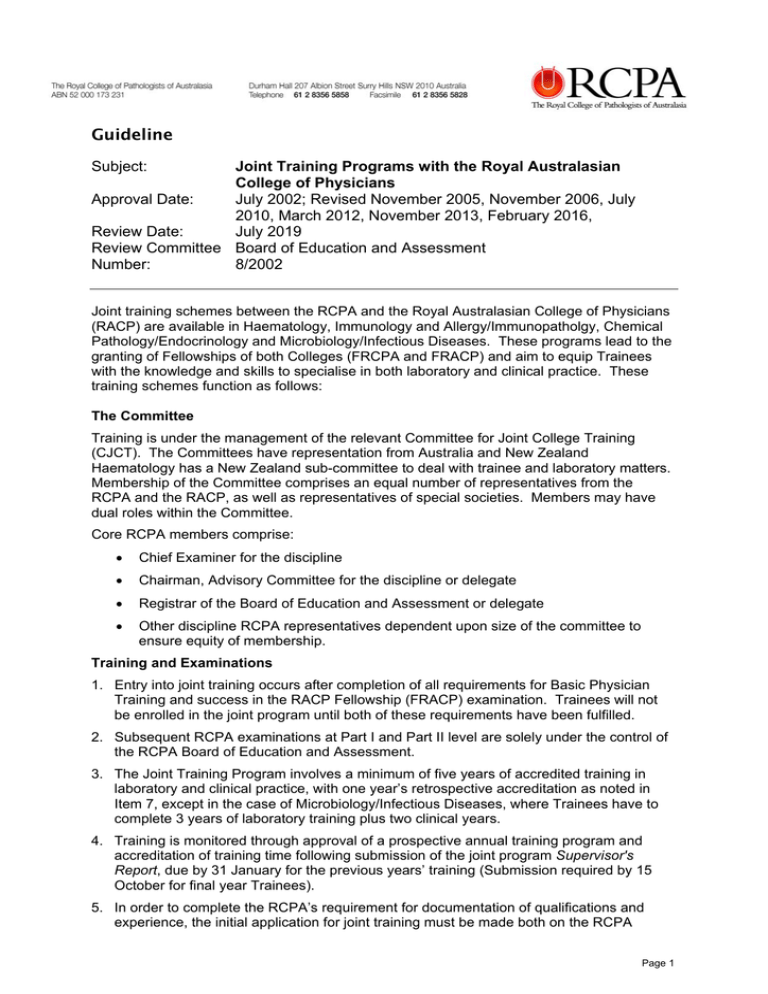
Guideline Subject: Joint Training Programs with the Royal Australasian College of Physicians Approval Date: July 2002; Revised November 2005, November 2006, July 2010, March 2012, November 2013, February 2016, Review Date: July 2019 Review Committee Board of Education and Assessment Number: 8/2002 Joint training schemes between the RCPA and the Royal Australasian College of Physicians (RACP) are available in Haematology, Immunology and Allergy/Immunopatholgy, Chemical Pathology/Endocrinology and Microbiology/Infectious Diseases. These programs lead to the granting of Fellowships of both Colleges (FRCPA and FRACP) and aim to equip Trainees with the knowledge and skills to specialise in both laboratory and clinical practice. These training schemes function as follows: The Committee Training is under the management of the relevant Committee for Joint College Training (CJCT). The Committees have representation from Australia and New Zealand Haematology has a New Zealand sub-committee to deal with trainee and laboratory matters. Membership of the Committee comprises an equal number of representatives from the RCPA and the RACP, as well as representatives of special societies. Members may have dual roles within the Committee. Core RCPA members comprise: Chief Examiner for the discipline Chairman, Advisory Committee for the discipline or delegate Registrar of the Board of Education and Assessment or delegate Other discipline RCPA representatives dependent upon size of the committee to ensure equity of membership. Training and Examinations 1. Entry into joint training occurs after completion of all requirements for Basic Physician Training and success in the RACP Fellowship (FRACP) examination. Trainees will not be enrolled in the joint program until both of these requirements have been fulfilled. 2. Subsequent RCPA examinations at Part I and Part II level are solely under the control of the RCPA Board of Education and Assessment. 3. The Joint Training Program involves a minimum of five years of accredited training in laboratory and clinical practice, with one year’s retrospective accreditation as noted in Item 7, except in the case of Microbiology/Infectious Diseases, where Trainees have to complete 3 years of laboratory training plus two clinical years. 4. Training is monitored through approval of a prospective annual training program and accreditation of training time following submission of the joint program Supervisor's Report, due by 31 January for the previous years’ training (Submission required by 15 October for final year Trainees). 5. In order to complete the RCPA’s requirement for documentation of qualifications and experience, the initial application for joint training must be made both on the RCPA Page 1 Application for Initial Registration and on the RACP form, with a copy sent by the Trainee to the RCPA. Relevant RACP forms are: Application thereafter for annual registration is submitted on the RACP form only, with a copy to the RCPA by 15 February of the training year. 6. On initial registration, joint Trainees must apply formally for one year’s retrospective accreditation for physician training, except in the case of Microbiology/Infectious Diseases. They are not required to pay a retrospective training fee. See item 3 above. 7. Joint Trainees are granted exemption from the Pathological Sciences examination on the basis of their successful FRACP Part I examination. Trainees are required to remain registered and pay training fees to both Colleges throughout their training. 8. The relevant CJCT or New Zealand Haematology Joint College Training Subcommittee will accredit sites for clinical training. The laboratory component of training must be undertaken in an RCPA accredited laboratory. Wherever possible, the Colleges will collaborate on site visits. However, accreditation by one College does not imply accreditation by both Colleges. 9. The laboratory component of training should ordinarily be under the supervision of a senior pathologist. 10. Joint Trainees must meet the rotation requirement of the RCPA. Training overseas may be approved as part fulfilment of the requirements. Note that Trainees may not complete both their clinical and laboratory training entirely within the clinical and laboratory service of one institution. 11. The duration of training accredited to each Trainee in a 12 month period will be determined at the accreditation meeting of the CJCT. The RCPA will be advised of accredited times by the RACP, in order to update Trainee records. 12. Where a CJCT is made aware of any problems with supervision or the training environment, the Registrar of the Board of Education and Assessment of the RCPA is notified. The Colleges will agree whether a joint site visit is required. 13. The Colleges will keep each other informed if any trainee has been identified as a trainee in difficulty with their College. This is a reciprocal arrangement to ensure the trainee is supported appropriately. RCPA Fellowship Joint Trainees will be eligible for recommendation to Fellowship by the Board of Education and Assessment of the RCPA when they have: Passed or been exempted from Pathological Sciences, Part I and Part II RCPA examinations Completed 5 years of training time as accredited by the Board of Education and Assessment on the advice of the Chief Examiner, including where applicable one year of retrospective accreditation for basic physician training. Been recommended for Fellowship by the RCPA Chief Examiner and the RACP Coordinator of Advanced Training of the relevant JSAC Subcommittee. Fellowship of the RCPA may be endorsed by the Board of Directors pending decision of the JSAC/Joint Subcommittee. The RACP admits new Fellows in March, June, September and December. Page 2
